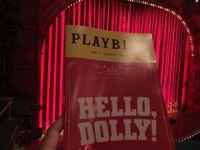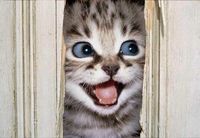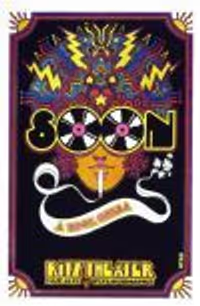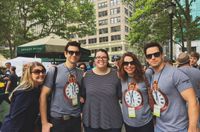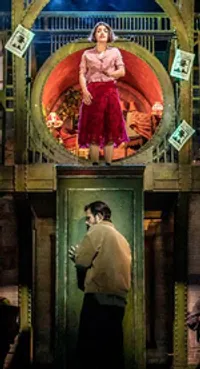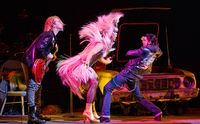Musical cliches and tropes that should go away already
VintageSnarker
Broadway Legend Joined: 1/30/15
#25Musical cliches and tropes that should go away already
Posted: 9/25/17 at 12:25am
I'm not sure how much these are cliches and tropes but...
I usually hate it when the ensemble is dancing in the middle of a song when they don't need to be there. You don't have to put bodies there just to fill the stage or to justify their paychecks. It usually serves no purpose and takes me out of the show.
I am tired of lazy rhyming dictionary lyrics. If I never hear "kiss" rhymed with "bliss" again, it'll be too soon.
I am tired of diversity being one black actor (usually a woman) cast to sing a gospel or belting number. Basically, Amber Riley on Glee.
Musicals set in a particular time or place that don't sound enough like the music from that region or time period. Everything doesn't have to be reminiscent of the same few contemporary musical theater composers.
I've had enough of the only prominent female character in the show just being there to support the white, male protagonist in his not terribly interesting struggle. If the female characters are best described a male character's wife, girlfriend, mother, daughter, etc. it can absolutely still be a fantastic show (Nine is a great exception) but the odds are not good. Or guy goes through vaguely misogynistic and/or stalkerish plot to win the girl. Essentially, I'm tired of the lazy musical equivalent of sitcoms. It's not that I don't like stories with male protagonists. It's that I don't like dull, predictable stories with male protagonists.
#26Musical cliches and tropes that should go away already
Posted: 9/25/17 at 2:24am
orlikethecolorpurple said: "Breaking the fourth wall when it’s not integral to the plot or storytelling. Hate, hate, hate it."
Yeah, because it's so much more believable when a character sings a soliloquy to the sofa.
Why do you even go to musicals? Or Shakespeare. Or Sophocles.
#27Musical cliches and tropes that should go away already
Posted: 9/25/17 at 2:33am
hork said: "I can agree with that. There's a lot of lazy hackwork to be found in jukebox musicals. But that's a failing of individual shows rather than the nature of the form. I think a talented writer could write a really amazing jukebox musical."
Then why has a talented writer never written one?
As the poster before you explained, it's just a lazy form. (And I just saw JB, finally, and didn't hate it as much as I thought I would.) Lazy because the songs are already sitting there and lazy because the audience already knows them and doesn't have to listen as closely. Just a bad practice all around.
With this exception: most musicals written before 1943 were sort of "juke box musicals" to begin with: songs were written to be commercial hits outside of the show. So reviving them with an extra hit or two or three doesn't strain the form.
But there's really no excuse with new plots or with shows written after Oklahoma!
#28Musical cliches and tropes that should go away already
Posted: 9/25/17 at 7:43am
Forcing in a romantic b-plot when it adds nothing necessary. We’ve seen romance. That’s all musicals were for like 50 years. Cant we move on?
adamgreer said: "Also, grocery bags. All anyone ever seems to buy when they come back from the grocery store is a celery stalk and a baguette."
Sometimes you’ll see milk or something that needs to be kept cold and it doesn’t go into a refrigerator and I just get stressed it will spoil or melt!
#29Musical cliches and tropes that should go away already
Posted: 9/25/17 at 8:18am
Writers and audiences symbiotically confusing:
1) "seriousness" with profundity; and
2) "lightness" with insipidity
#30Musical cliches and tropes that should go away already
Posted: 9/25/17 at 4:53pm
I don't have many, but in contemporary musical theatre, making lines out of cheap laugh pop culuture references. If there's going to be modern references of any kind, at least make them well-written and witty.
Also, please stop with the Avenue Q-esque jokes. I may be in the minority, but a couple times per show is enough. Dear Evan Hansen is fantastic in my opinion, but Jared's character only got more unlikeable nearly every time he appeared. We get it, Steven Levenson, you have a cliche that teenagers are always obnoxious and pretentious. You don't have to fill 50 lines full of irritating and repetitive jokes. The exception is when the show is meant to be a comedic satire (Book of Mormon, Something Rotten, parts of Hairspray, Drowsy Chaperone, etc.)
#31Musical cliches and tropes that should go away already
Posted: 9/25/17 at 5:04pm
raddersons said: "Forcing in a romantic b-plot when it adds nothingnecessary. We’ve seen romance. That’s all musicals were for like 50 years. Cant we move on?
I agree with that. Like, why give a romantic b-plot to the freakin' butler in Dirty Rotten Scoundrels? It just ground the story to a halt.
#32Musical cliches and tropes that should go away already
Posted: 9/25/17 at 5:11pm
Small-cast "rock" musicals performed on a set that looks like, or actually is, scaffolding.
Bell0708
Stand-by Joined: 7/23/13
#33Musical cliches and tropes that should go away already
Posted: 9/25/17 at 5:25pm
I hate it when they interrupt the show to sing some stupid song. Um, wait a minute....
RndmAnswrs4RndmQstns
Stand-by Joined: 9/8/17
#34Musical cliches and tropes that should go away already
Posted: 9/25/17 at 5:28pm
Kad said: "Small-cast "rock" musicals performed on a set that looks like, or actually is, scaffolding."
Next to Normal, maybe Deaf-West's Spring Awakening (depending on your definition of "small-cast"![]() , and what else?
, and what else?
#35Musical cliches and tropes that should go away already
Posted: 9/25/17 at 5:29pm
^^Bloody Bloody Andrew Jackson & the revival of Rent definitely both fall into this category.
I actually usually fall for these real hard...
RndmAnswrs4RndmQstns
Stand-by Joined: 9/8/17
#36Musical cliches and tropes that should go away already
Posted: 9/25/17 at 5:30pm
Ah, haven't seen either!
#37Musical cliches and tropes that should go away already
Posted: 9/25/17 at 5:59pm
hork said: "raddersons said: "Forcing in a romantic b-plot when it adds nothingnecessary. We’ve seen romance. That’s all musicals were for like 50 years. Cant we move on?
I agree with that. Like, why give a romantic b-plot to the freakin' butler in Dirty Rotten Scoundrels? It just ground the story to a halt."
Exactly. Romantic B-plots are basically the foundation of the b-plot, and are often great - sometimes it adds something nice, (She Loves Me, Illona and Kodai act as a foil to Amalia and Georg in a way), and sometimes it ties into the plot (Joanna and Anthony in Sweeney) but lots of times they are thrown in for the sake of it. Some modern examples:
-Nancy and the cameraman from Groundhog Day, although this was pretty minor
-That girl from the library in Bright Star that existed solely to sing love songs about the lead male (I think?)
-Yes, the Butler and Joanna Gleason's character in DRS
#38Musical cliches and tropes that should go away already
Posted: 9/25/17 at 6:33pm
Period pieces that make jokey "predictions" about the future. "A black president? Never!" "Who would ever want a phone in their car?" "That's as unbelievable as Cher winning an Oscar!"
I guess it's not specific to musicals but I detest it nonetheless. "American Psycho" was full of it, and I otherwise liked the show. But those "jokes" got bigger laughs than anything else in the show so I guess they're here to stay.
VintageSnarker
Broadway Legend Joined: 1/30/15
#39Musical cliches and tropes that should go away already
Posted: 9/25/17 at 6:46pm
I don't know. Probably due in large part to it being Joanna Gleason and Gregory Jbara, I didn't mind that part of Dirty Rotten Scoundrels. Especially since it served to fold in a female character who (if I recall correctly) wouldn't have had much reason to stick around after "What Was a Woman To Do?"
I'm with you on Bright Star though. I thought Hannah Elless was pretty bad in that show (rarely landing her jokes) and it just felt like they were spinning their wheels until the very obvious reveal. If Billy had been better developed as a character or both younger characters had been better developed it might have been an actual distraction from the obvious reveal.
#40Musical cliches and tropes that should go away already
Posted: 9/25/17 at 11:16pm
Exactly. Romantic B-plots are basically the foundation of the b-plot, and are often great - sometimes it adds something nice, (She Loves Me, Illona and Kodai act as a foil to Amalia and Georg in a way), and sometimes it ties into the plot (Joanna and Anthony in Sweeney)but lots of times they are thrown in for the sake of it. Some modern examples:
-Nancy and the cameraman from Groundhog Day, although this was pretty minor
I would argue it was important despite being minor - supposed to represent other people benefitting once Phil stepped back. He was a dick to nancy+others, once he stopped + stepped back, you see what was “supposed” to happen, and Nancy gets a guy that sees her as “more than just collateral”. Specific to that show, the background plots matter a lot IMO. But I’m also super guilty of being a sucker for ensemble shows.
Can’t think of too many B-plot romances, but I still am not a big fan of the romance in bandstand that someone mentioned earlier, though I do love the show. It just felt forced / unnecessary to me, and I really liked their dynamic as friends.
I dont have my own pet peeves but this whole thread reminds me of Oh, Hello, which spent a large portion of the show making fun of theater tropes (the 1-sided telephone call, etc). Also not a pet peeve, but I wish more shows would include overture+entreact on the cast album (and bows and exit music!)
#41Musical cliches and tropes that should go away already
Posted: 9/25/17 at 11:34pm
Every musicl comedy needing a tap break. It's not funny. It's still not funny.
Super nasal "musicl theater" singing. It's cheesy.
Rainah
Broadway Star Joined: 11/24/16
#42Musical cliches and tropes that should go away already
Posted: 9/25/17 at 11:48pm
Echoing "Diversity being one black person in the ensemble" and I will add "everyone sounding the same"
I know there is a classic style of theatre voice, but I have found myself really loving shows that break out of that with unusual voices that suit their characters. There should be a place for voices like LMM, Brittain Ashford, ect. especially when they blend with other voices - one example that comes to mind is how much the original Schuyler Sisters benefited from having three very different kinds of voices harmonizing. That has been lacking in every other trio I've heard sing it.
SharksVsJets
Stand-by Joined: 4/22/17
#43Musical cliches and tropes that should go away already
Posted: 9/26/17 at 1:24am
The "comic" tango. Not hilarious.
#44Musical cliches and tropes that should go away already
Posted: 9/26/17 at 7:05am
A presentational opening number that gets a reprise at the very end of the show, during which the cast stares at the audience self-importantly to ensure it understands that the song Has So Much More Meaning Now. (Yes, some good musicals do this, but it's still irritating.)
#45Musical cliches and tropes that should go away already
Posted: 9/26/17 at 11:19am
Song reprises(usually the opening number)as scene transitions. It's so so lazy
#46Musical cliches and tropes that should go away already
Posted: 9/26/17 at 11:40am
Ensembles repeating the name of the title character multiple times, or ensembles singing the word that describe a main character repeatedly.
Wickeeeeeeed, Wickeeeeeeeed, Wickeeeeeeeeed!!! Yes, we get it. It's like the writers had a note book with all the rules on how to make a musical. Mandatory ensemble shout there, mandatory funny song there, happy dance there, 11 o clock sad song here and you have a musical!
His name is Alexander Hamilton, My name is Alexander Hamilton, His name is Alexander Hamilton, headflip to the audience on the last chord.
Wicked and Hamilton are not musicals. They are parodies.
Fosse76
Broadway Legend Joined: 3/21/05
#47Musical cliches and tropes that should go away already
Posted: 9/26/17 at 12:00pm
imeldasturn said: "I wish they stopped mentioning stars, sky, moon and eyes in the lyrics. Seriously. Stop."
You must really hate Ragtime's "back to Before" then!
#48Musical cliches and tropes that should go away already
Posted: 9/26/17 at 12:24pm
henrikegerman said: "Writers and audiences symbiotically confusing:
1) "seriousness" with profundity; and
2) "lightness" with insipidity"
Still prepping for those SATs, I see. Good for you!
It's never too late. LOL.
#49Musical cliches and tropes that should go away already
Posted: 9/26/17 at 12:27pm
Kad said: "Small-cast "rock" musicals performed on a set that looks like, or actually is, scaffolding."
Which reminds me of a peeve of my own: shows staged so that all or most of the primary action takes place behind a table. (See RENT, DREAMGIRLS.)
Why not behind a cement wall?
Videos





